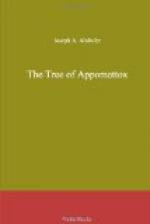Slade threw up his arms, fell back on their side of the mountain and then slid down the slippery slope. Warner watched him with a kind of horrified fascination as he shot over the clear ice. His body struck a small pine presently and shattered it, the broken pieces of the icy sheath flying in the air like crystals. After a momentary pause from the resistance Slade went on, slid over a shelf, and disappeared in a deep drift.
“He’s out o’ business,” said Reed. “I reckon we’d better go down thar, an’ see ef he’s all broke to pieces.”
They climbed down slowly and painfully, reaching the drift, but to their amazement Slade was not there. They found his rifle and spots of blood, but the outlaw was gone, a thin red trail that led down a rift showing the way he went.
“We hit our b’ar an’ took the bite out uv him,” said Reed philosophically, “but we ain’t got his hide to show. Still he’s all broke up, jest the same, ‘cause he didn’t even think to take his gun, an’ this red trail shows that we won’t be bothered by him ag’in fur a long time.”
Warner would have preferred the annihilation or capture of Slade, whom he truly called a rattlesnake or cobra, but he was satisfied, nevertheless. He had destroyed the guerrilla’s power to harm for a long time, at least, and not a man of his had been hurt. He was sure to receive Colonel Winchester’s words of approval, and he felt the swell of pride, but did not show it by word or manner.
Carrying the rifle, as the visible proof of victory, they returned to the cove, and received from Colonel Winchester the words for which they were grateful. Further proof was the failure of Slade to return and the lifting of the terrible weight which a single man had put upon them. They could now go about in the open, as they pleased, the big fires were built up again, and cheerfulness returned.
The mountaineers brought in more food the next day, and the following night Reed and another mountaineer crossed the ridge and were lucky enough to shoot a fat bear in a ravine. They dressed it there, and, between them, managed to bring the body back to the camp. A day later they secured another, and there was a great feast of fresh meat.
That night the weather rapidly turned warmer and all knew the big thaw was at hand. A long heavy rain that lasted almost until daylight hastened it and great floods roared down the slopes. Tons and tons of melting snow also slid into the valley, and the creek became a booming torrent. They were more thankful than ever for their huts and lean-tos, and all except the sentinels clung closely to their shelter.
Throughout the day the mountains were veiled in vapors from the rain and the melting snow, and, after another night, the troop saddled and departed, the horses treading ankle deep in mud, but their riders eager to get away.
“We overstayed our time,” said Dick, looking back, “but it was a good cove for us. Our presence there tempted the enemy to battle, and we destroyed him. Then we had shelter and a home when the great storm came.”




